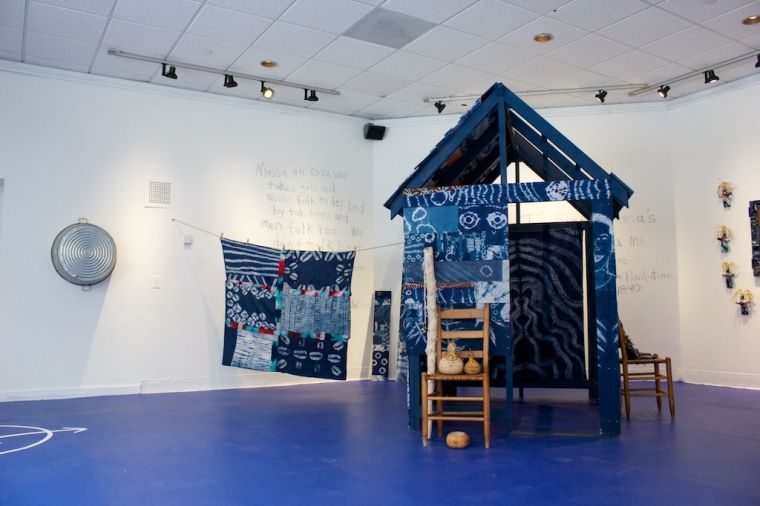This month, the Harbor Art Gallery at the University of Massachusetts Boston held an opening reception and performance for Ife Franklin’s “The Indigo Project.” Franklin’s exhibit will be available for viewing until March 16, when the Gallery will hold a closing reception for the exhibit.
“The Indigo Project” takes us through an emotional passage that charts the harsh reality of slavery. This exhibit is not to be glazed over, for you may lose sight of its purpose. The African art and tie-dye fabrics covering the walls are created to be interpreted and discussed.
Franklin discusses how the project began and why it is deeply imperative for today’s generation to feel a connection with their past enslaved ancestors.
“This project is a combination of different things. It’s love of our ancestors, history, culture, community. It’s looking back at our rich history that we don’t talk about. That’s what the cabin is for,” said Franklin.
“It’s a place we can hold on to our culture, our first ‘hood.’ The slave quarters, it’s the first place we see. We were born there, died there. The smell of the spices from our food was born there.”
She added, “The cabin is what I use to bring the community together to have verbal or non-verbal conversations about slavery, the history of enslavement, our connection as white people and black people, our DNA connection, stuff we don’t talk about.”
The cabin stands in the middle of the gallery covered in blue tie-dye fabric. Franklin recounts the significance of the African art pieces to the social problems we fail to communicate with each other.
She said, “Let’s put it in the art work. We can’t talk about race. We can’t talk about class. We can’t talk about it because it’s so hard. We put all of that into the fabric. I want to do something beautiful for them. Those houses were not cute. The situation was appalling. We all know the story but also I want to do this because a lot of people don’t’ know the story. They don’t know the truth.”
Franklin celebrates the overwhelming love and strength of our enslaved ancestors as well as their sense of community. It is important to swallow the brutality of slavery that we have all learned about at one point in time, Franklin does not dismiss that fact, but our enslaved ancestors are who we should desire to draw close to for various reasons.
“There’s so much love in this history. There was a hell of a lot of love. A hell of a lot of self-love because how could they get up if they weren’t thinking ‘there’s got to be something more than this. I want my kids to have something else,” she said.
“It’s time for people to wake up around this story. It’s time for us to stop acting like we don’t know this story. It’s time for us all to embrace this story. Feel what we need to feel and have more of an understanding. I’m not talking about feel what you need to feel and let it go. Don’t tell me to get over it, then get over George Washington, get over Abe, then get over them if you want me to get over mine. Everybody’s history is important.”
Franklin has been working on this project for the last six years, but she is positive there’s is nothing more important than continuing this work.
“I said I’ve been working on this project for the past six years, but I’ve actually been working on it for the last twenty years since I’ve been in school. It is my calling. It is my work.”
History makes waves at Ife Franklin’s ‘The Indigo Project’
February 18, 2014
'The Indigo Project'






















































